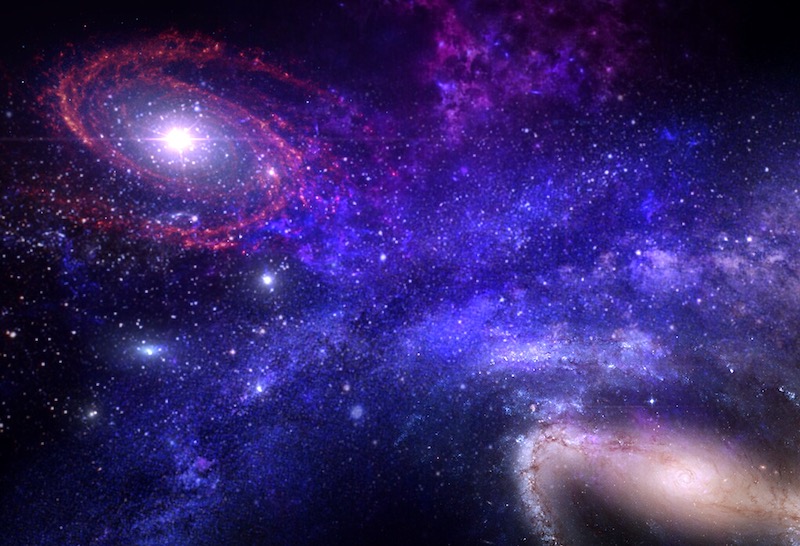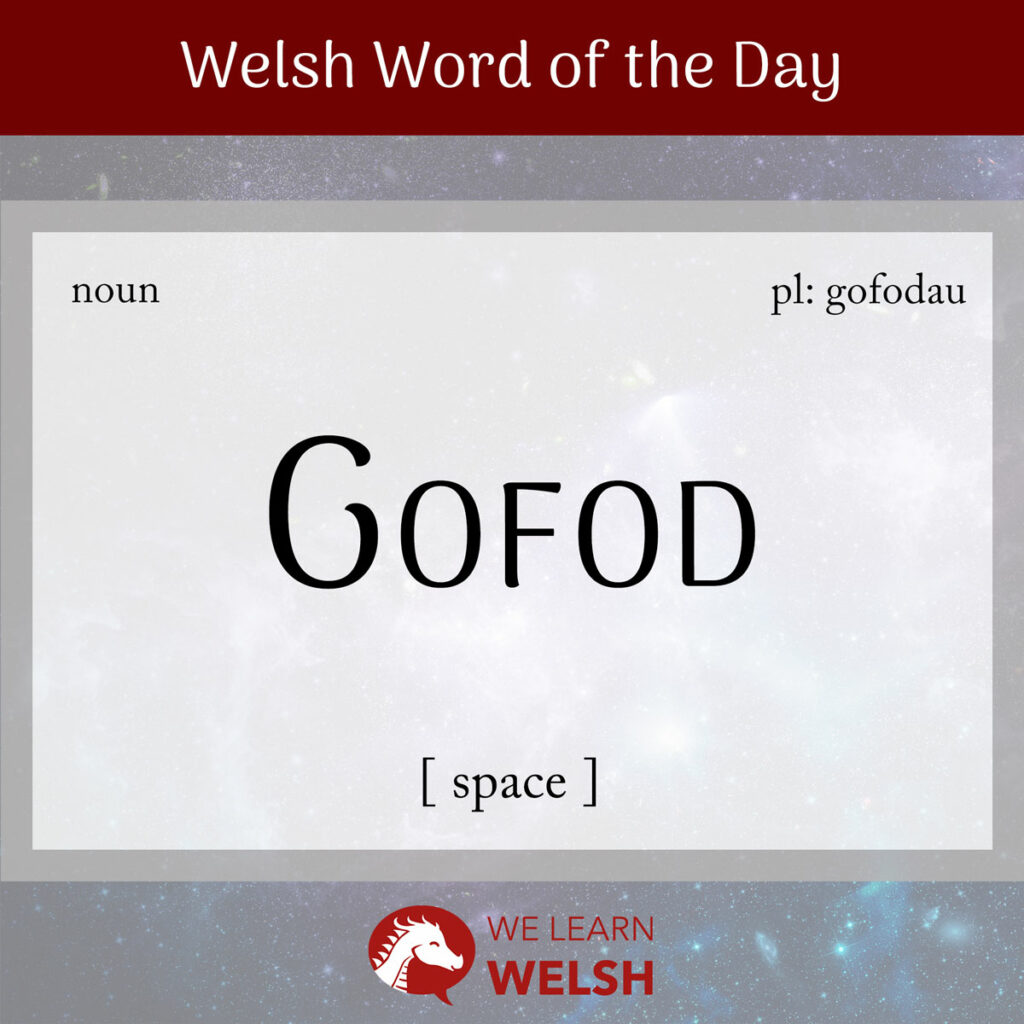Today’s Welsh Word of the Day is gofod, which means space. Just like the English word space, gofod (plural: gofodau) can refer to outer space or simply to a gap (e.g. leave a space for me!).
gofod
space
Gofod is a masculine noun and is susceptible to the soft and nasal mutations.
Soft mutation
ofod
Nasal mutation
ngofod
Aspirate mutation
N/A
When I was younger, I was very interested in outer space (y gofod); I remember putting up a big poster about the planets (y planedau) on my bedroom wall. My mum and granddad even made me a space-themed mobile and and stuck glow-in-the-dark stars (sêr) to my ceiling!
You may have noticed that I said y gofod (lit. the space) rather than just gofod. In English, space acts as a place-name in the same way as, say, Ethiopia or London. In Welsh, however, we put the definite article (the) in front of space in the same way that we say the universe or the Solar System in English.
This means that in Welsh we don’t automatically distinguish between in space (in outer space) and in the space (e.g. in the space behind the sofa); yn y gofod can be used in both of these contexts. Although the broader context of a conversation usually prevents confusion, you may wish to use a different word to describe a space, such as gwagle (a space or void) or bwlch (gap) for added clarity.

Mae’r gofod yn llawn rhyfeddodau.
Space is full of marvels.
One of my favourite songs to listen to as a young child was Cân y Gofod (The Space Song) by Dafydd Iwan. The lyrics contain some useful space vocabulary, so let’s take a look at some of them below:
O, mi garwn fynd am drip i’r lleuad
I neidio ugain llath i’r awyr ddu.
Oh, I’d love to go on a trip to the moon
To jump twenty yards into the black sky.
This verse introduces a very common space-related word: lleuad, which means moon. Sometimes, you will also hear the word lloer used to mean moon. Let’s look at another verse:
O mi garwn fynd ar wib mewn llong ofod
A throedio’r Llwybr Llaethog wrth fy modd.
Oh, I’d love to go at full speed in a spaceship
And tread the Milky Way to my heart’s content.
This verse teaches us even more ll words: llong ofod and Llwybr Llaethog. Llong ofod means spaceship and Llwybr Llaethog is the Welsh translation of Milky Way. Llwybr means path and llaethog (from llaeth) means milky, so it’s quite a literal translation. If you’re struggling with all these ll sounds, try placing your tongue behind your top teeth as if you’re about to pronounce an L and then blowing out air instead. Now, time for one last verse:
O, mi garwn fynd ar sgowt i Sadwrn
A gweled rhyfeddodau hardd y sêr.
Oh, I’d love to scout out Saturn
And see the beautiful wonders of the stars.
This verse introduces us to one of the names of the planets in Welsh: Sadwrn (Saturn). Eagle-eyed readers may have already spotted that Sadwrn is also used in the Welsh word for Saturday: Dydd Sadwrn. This isn’t the only Welsh day of the week named after a planet, either! Here is a list of the planets of the Solar System (Cysawd yr Haul) with the corresponding days of the week.
- Mercher = Mercury
- Gwener = Venus
- Y Ddaear = Earth
- Mawrth = Mars
- Iau = Jupiter
- Sadwrn = Saturn
- Wranws = Uranus
- Neifion = Neptune
- Dydd Mercher = Wednesday
- Dydd Gwener = Friday
- Dydd Mawrth = Tuesday
- Dydd Iau = Thursday
- Dydd Sadwrn = Saturday
(and if, like me, you’re still sad that Pluto isn’t considered a proper planet anymore…)
- Plwton = Pluto
Here is some more useful space vocabulary:
- siwt ofod = spacesuit
- gofodwr = astronaut
- estron = alien
- cylchdro, cylchlwybr = orbit
- Gorsaf Ofod Ryngwladol = International Space Station
- roced = rocket
- galaeth = galaxy
- lloeren = satellite
- bydysawd = universe
But while you’re dreaming of the stars, don’t forget to come back down every now and then to appreciate our wonderful planet. As the last verse of Cân y Gofod says:
O, mi garwn fynd am dro i’r gofod
Dim ond os cawn i ddod i Gymru’n ôl.
Oh, I’d love to go for a walk to space
Only if I’d get to come back to Wales.
You can listen to Cân y Gofod below and try to sing along!

